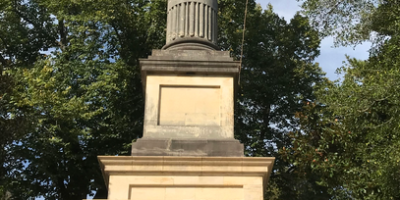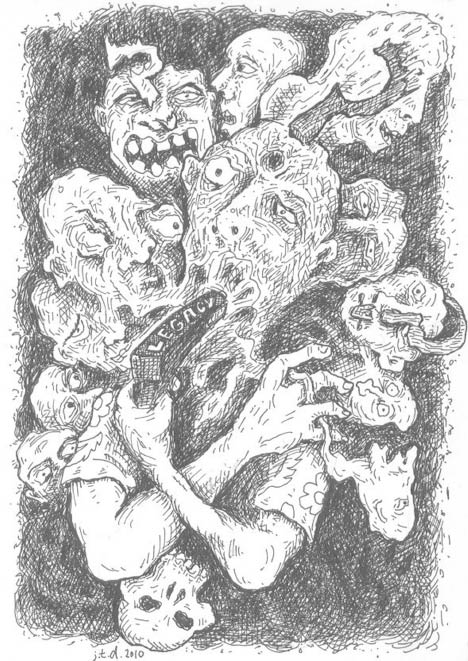By Danny Mayer
Illustration by J.T. Dockery
Editor’s Note: Upon the death of Hunter S. Thompson, this article was submitted to, but never published by, Nougat Magazine. One of the perks of owning your own paper is self-indulgence. Here’s one such self-indulgent moment on the fifth anniversary of Hunter S. Thompson’s suicide.
February 21, 2005
7:00 A.M.
Life just seems too huge and too fascinating for me to begin thinking about curing my restlessness at this stage of the game. Maybe later.
Hunter S. Thompson, June 4, 1958
Mistah Kurtz—he dead.
Joseph Conrad
I haven’t had a drink this early in quite some time, unless you count an 8 A.M. nightcap as an early drink. It’s been even longer since I’ve had rum on ice.
My wife Julie woke me up this morning, per usual, at 6:00 A.M. and greeted me with the news of the suicide of Hunter S. Thompson. So as she put on her scrubs and prepared for another day humping the American dream thirty miles away at the Toyota health clinic in Georgetown, I got to watch Matt Lauer and the rest of the morning fucks tell me that Thompson had blown his brains out on the grounds of his fortified Aspen compound.
A Hemingway fan to the end.
The news initially caught me by surprise, but as the rum and a rising morningn sun have begun to warm my body and mind, it’s all beginning to make a certain sense to me. About as much sense as wars in Iraq and Afghanistan, which is to say death is a reality and sense-maker in and of itself.
As the corporate twenty-four hour news stations have begun to come alive with their morning news highlights—I’ve got MSNBC blaring in one room, Fox in another and Jerry Jeff on the CD player—they have begun to give the Thompson story some play, describing his death as another nail in that old 1960s coffin before moving on to other, more important matters, such as the impending Michael Jackson trial. The story was pretty uniform across the board, diverging little from Lauer’s keen insights: “Gonzo journalist…a drug fatcat…Fear and Loathing…dope fiend…countercultural icon…Nixon…and did we mention he did a lot of drugs?”
Before I go any further, I should here state, in the interests of journalistic integrity, that I do not do drugs, so long as you agree with me that organic weeds, certain acid compounds, alcohol and mushrooms are not drugs. And while I find Fear and Loathing in Las Vegas, the book around which much of the cult of Thompson formed, a brilliant and immensely sorrowful work of failed cultural and authorial momentum, it’s never been what drew me to the Doctor of Journalism.
I of course know several friends—two in particular from high school standout—who read that book and “got it” enough to have their own extended Fear and Loathing weekends to places like Epcot, zapped on liquid acid, chugging Chivas and popping Xannies bought through marathon 14 hour drives from Tuscaloosa to the middle of some nondescript bridge separating Texas from Mexico, and back again. (Nobody I know, then or now, has been able to locate adrenochrome.)
I’ve no doubt they had a smashing time, and I always loved talking Thompson—nearly always Fear and Loathing in Las Vegas—with them. I am, after all, a wannabe Doctor of Literature, and I’m certainly not going to minimize the bodily pleasures of a madcap king-hell fuckaround that the book indulges us in. I’ve had my fair share, too, and more than one inspired in large part by Thompson.
But at the same time I always felt like that Flamingo Hotel desk-clerk in Fear and Loathing in Las Vegas who’s telling a pig couple from the heartland that their room will not be available. “Listen,” I want to say as I nod my head, smile and listen to their trips, “you’re missing the fucking point. A pathetically eager acid freak is a pathetically eager acid freak, in 2005 the same as 1972…the same as 1965. There’s more to it than the Hawaiian shirts— although the shirts are of course key.” Mahalo.
A Different Hunter
I remember buying, just after its publication in 1997, The Proud Highway, a collection of letters Thompson wrote in the late 50s and 60s. It is one of the most beautiful histories of American life during this time period, or any other for that matter, and I often return to it in my more cynical moments—the long duree of Shock and Awe and Enduring Freedom come to mind here—to remind me that some ideas of America are OK.
The letters follow Thompson, a kid just out of Louisville’s Male High School, as he becomes a squatter in NYC typing Hemingway’s The Sun Also Rises to feel the rhythms in the sentences. We read along as Thompson covers bowling in Puerto Rico alongside a young William Kennedy, hunts wild boar in Big Sur next to Joan Baez, becomes drinking buddies with Charles Kuralt in Rio while a freelance journalist, and swims naked in the Gulf of Mexico under a summer moonlight while on leave from the Air Force. All of this done while attempting to write the Great American Novel.
If the case can be made that Thompson had a drug problem, I think it should be noted that, long before and far exceeding it, he had an America Problem.
It was just such a committed, thoughtful and most of all footloose life I once wanted, and on many nights still want dearly. For me, Thompson’s letters were that American Dream he so often proclaimed was dead. I wanted to be him. Not the drug-addled beast in Vegas, but the unknown 23 year-old freelance kid journalist of 1960 just run off his bowling beat in Puerto Rico—in fact run off the island altogether—dead broke with mounting debt, stuck in Bermuda awaiting transport to Spain, yet still maddeningly confident in his instincts to write in a letter to a friend, “I feel extremely successful, without being able to afford the price of a single beer.”
Reading that at the age of 22 holed up all alone in a cold Montana winter, at an age when Thompson had already spent time bouncing around New York City, writing in a cabin without electricity in upstate New York, and covering sports in Puerto Rico, when he had already finished one failed novel and begun work on another, when he would soon spend a year on a paltry and unstable unknown freelance journalist’s salary hopping around South America (at times securing passage on drug-running ships), I was sure my own America Problem, my own impeccable instincts, my own youthful exuberance, would carry me along.
At 29, married, with a mortgage, two dogs and still no published story to my name, it’s a fantasy that I still indulge in—on the edge, writing my third (failed) novel, measuring success by the amount of cheap beer I can buy, awaiting a new move with Julie—a fantasy that I suspect a good number of us still harbor, although with Hunter’s passing, at the moment that unbridled optimism feels like it has gone with him.
Listen, for example, to how Thompson opens up The Rum Diary:
“In the early Fifties, when San Juan first became a tourist town, an ex-jockey named Al Arbonito built a bar in the patio behind his house on Calle O’Leary… It was a pleasant place to drink, especially in the mornings when the sun was still and cool and the salt mist came up from the ocean to give the air a crisp, healthy smell that for a few early hours would hold its own against the steaming, sweaty heat that clamps San Juan at noon and remains until long after sundown.”
Somewhere in there, in the eternal optimism of a new day burning through the old, is why I’ve got my own rum drink in hand, 25 degree Lexington weather be damned.
Out on the Edge
The early morning, in fact, was always good for Thompson, whether that morning was under the dark of a 4:00 A.M. letter shot off to Charles Kuralt, or in the growing light of a 9:00 A.M. rum drink with colleagues on Calle O’Leary. Beginnings, possibility. Go West Young Man…chock full of American spirit…Horatio Alger style.
Until, of course, those new days stopped being so innocent and full of possibility.
Like that picture of Dorian Gray, I suspect that Thompson was America’s ugly, beastly double: the outlaw journalist always one-upping that rugged frontier individualism America prides itself on; the perpetually twisted writer outdoing the alcoholisms of Faulkner, Hemingway and Fitzgerald combined; the lawbreaking citizen running for sheriff of Aspen on a platform calling for a return of public bastinados to punish dishonest dope dealers and real estate agents alike; the peace activist living within a fortified compound of guns and explosives; the bear hunter accidentally shooting his secretary.
Thompson was less an American Anomaly than the country’s unbridled and limitless possibilities made human. He was a beast, all right, a beast made out of our own deluded sense of what makes us so uniquely special. And sweet Jesus it wasn’t pretty—although we loved him anyway, republican and democrat, conservative and liberal, MSNBC and Fox, Pat Buchanan and John Stewart.
He was America’s retched excesses, all its myths that we’ve been too long from examining, collapsed in on themselves, and finally blown away by its own hands, by its own rifle, on its own fortified compound. Kaput. Kaboom. Nada, Nada.





RR Greengrass
I saw Thompson and Johnny Depp on tour together. The author would only answer questions about fire arms. Then they invited underage girls to come onstage to snuggle.
An original writer, no doubt, he was also a ruthless manipulative teenaged alcoholic who never gave a damn who he dragged along into his dementia.
Sorry, but that’s my take on an American icon of wasted youth, desperate age, and cowardly death.